This week I have five wheels for you - or at least, things like wheels. Yes, I know I've done wheels before, but I love them!
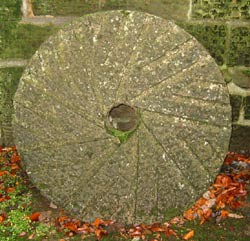 |
| English millstone |
This one's from a different kind of mill. It's all that remains of the old King's Mill in Castle Donington, Leicestershire. It's wlocally rumoured to have been the place where paper for banknotes was made - hence the King's Mill - but in fact it was used to grind flint and plaster for the pottery industry, which were then shipped to the Potteries in Stoke along the nearby River Trent.
This isn't a wheel at all - because it never turned. In fact it's a support for one of the walls at Caudwell's Mill (bit of a theme going on here) at Rowsley in Derbyshire. Very close to Chatsworth. It's a grade II* listed, steam-powered, roller flour mill.
This isn't a wheel either. It's an ancient symbol of eternity, a spiral, carved onto a very old upright stone in Bakewell Church yard in Derbyshire. Not sure if it's an obelisk or the base of a cross. But it's an impressive piece of carving.
Now this is a lot of wheels that all work together. This is "the bombe", the machine invented by Alan Turing to break the German Enigma code during WWII. Well actually, it's a replica of it at the National Computing Museum in Bletchley, Buckinghamshire. Bletchley was, of course, the home of the GCHQ codebreakers. You can see it working there. What it does (did) is carry out all the different potential combinations of letters by spinning all the dials you can see in the photo. It's a very early form of computer.
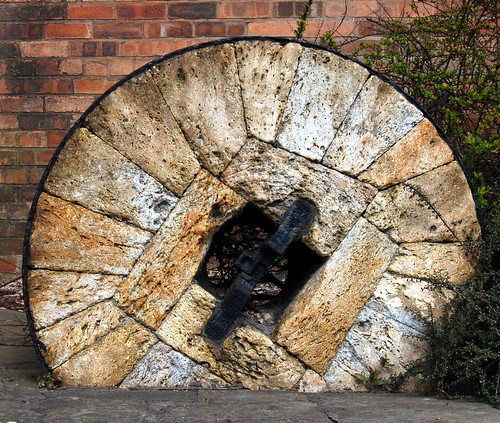
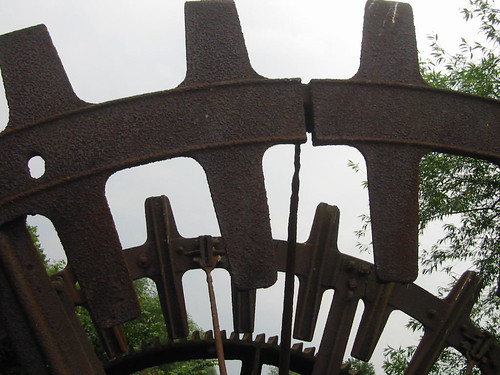
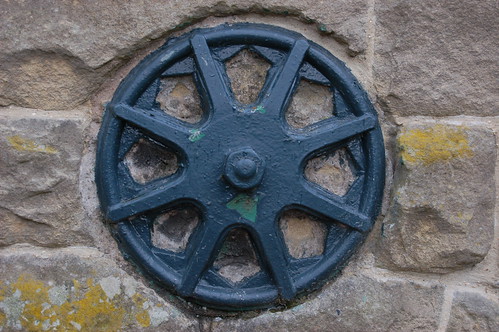

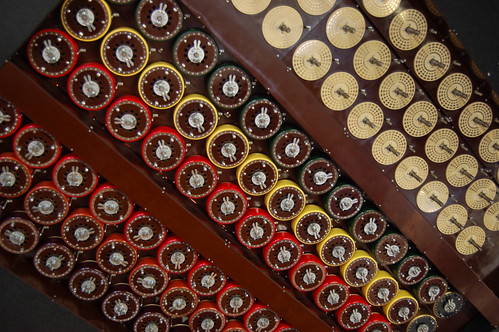
I'm loving all the wheels. Had quite a year of wheels after my work at the local water mill. Nothing more relaxing than watching the wheel turn on a hot summers day. Memories :) B
ReplyDeleteI'm so glad you love history! I learn something new when I visit with you. Enjoyed seeing all the "wheels".
ReplyDeleteBeautiful post! I love all the wheels but my favourite has to be the one at the church is just stunning. How lucky you are to be able to see them all!
ReplyDeleteHappy Five on Friday
Wonderful wheels! I love the mill wheels and am interested to know about the King's Mill in Castle Donington and the Potteries here, love Rowsley Mill:)
ReplyDeleteThe Kings Mill at Donington is next to the Priest House Hotel. (There are signs for it - just keep driving until you run out of road!)
DeleteI really did enjoy your post today, learning so much. A great five. Have a great weekend.
ReplyDeleteI love the wheels, and it the different textures of them all.
ReplyDeleteHow fabulous to live within distance of so many fascinating old historical places. Loved your post of wheels, but not wheels. It tickled me a bit.
ReplyDeleteLoving all the different wheel, I think my favourite though has to be the eternity carving, love it
ReplyDeleteGorgeous wheels and symbols. I was always a fried of old mills.
ReplyDeleteThe last photo seems somehow scary (but such technically things seem for me often scary - )
Happy Christmas time
A great selection of wheels, what a useful invention!🙂
ReplyDeleteGreat blog this week, so interesting, my husband wants to know if you know how the French managed to put their wheel together. I have wanted to visit Bletchley Park forever.
ReplyDeleteI always enjoy your informative posts. I'll ask the same question as above - how do the French keep their wheel together? It looks as if it's banded in metal. After seeing The Imitation Game a couple of years ago, the decoding machine became much more impressive. How great for you to see a replica.
ReplyDeleteInteresting! Thanks for sharing "wheels" that caught your attention. I enjoyed learning about them. I am curious now about how wheels hold together to accomplish their work, especially since the dial on my slow cooker popped off tonight after nearly 40 years of faithful service. (the plastic clamp holding it to the metal control broke :(
ReplyDeleteWhat a great collection of wheels and spinning round things! I didn't know about the French mill wheels before, that is interesting!
ReplyDeleteSorry all, for not answering the question! Yes, the French wheel is bound in metal to hold the pieces together.
ReplyDeleteInteresting post on wheels! We have some mill stones or grinding stones that we've bought at auctions and sales and such. We use them as decorations in the garden.
ReplyDeleteMerry Christmas!
Cindy